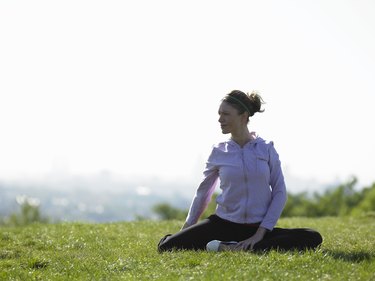
Mental health statistics show 19 percent of U.S. adults live with an anxiety disorder, according to the National Alliance on Mental Illness. Although it's less common to experience anxiety after working out, it could happen. Exercise may cause an acute increase in anxiety, but it benefits mental health in the long run.
Tip
Exercise triggers the body's fight-or-flight response, which can cause acute stress. Over time, exercise may increase your resilience to stress and improve anxiety symptoms.
Video of the Day
Anxiety and the Stress Response
Do you feel your heart pumping faster after leaving the gym? If you also experience tension, restlessness and increased sweating, anxiety might be the culprit. While it's true that exercise may help reduce stress and anxiety, it can also trigger the body's stress response in the short-term, causing anxiety after a workout.
Video of the Day
When you're stressed out, the amygdala, a brain area that regulates emotions, sends a distress signal to the hypothalamus, a brain region that controls your heartbeat, breathing and other bodily functions. This activates the sympathetic nervous system, which triggers the fight-or-flight response and causes the adrenal glands to release adrenaline, cortisol and other hormones.
These reactions occur in a matter of seconds, making you feel more alert. Your heart rate and blood pressure go up, your senses become sharper and you begin to sweat more. Think of it as a built-in self-defense mechanism. As soon as the threat goes away, the stress hormone cortisol levels return to normal, explains Harvard Health Publishing.
The fight-or-flight response is there to protect you from potential threats. Chronic stress, on the other hand, occurs over a long period of time, keeping your cortisol levels up for weeks or even months. As the Anxiety and Depression Association of America (ADAA) notes, anxiety is often a reaction to stress.
Warning
Sometimes, the body’s “fight-or-flight” response may trigger panic attacks, causing a rapid heartbeat, difficulty breathing, stomach distress and fear. According to the University of Michigan, these symptoms are similar to those induced by acute stress.
What Causes Anxiety After Exercise?
If you experience anxiety after exercise, you may be wondering what's causing it. After all, exercise is supposed to relieve stress and anxiety, right? That's true, but it may also cause a temporary increase in cortisol levels and trigger the fight-or-flight response. These effects are usually short-lived, though.
In a small study published in the February 2018 edition of Clinical Practice and Epidemiology in Mental Health, subjects who engaged in aerobic training experienced an increase in stress levels immediately after exercise. The survey found that aerobic exercise may raise anxiety in the short-term, but regular cardiovascular training may help reduce anxiety and depression symptoms.
Another small study, featured in Frontiers in Psychology in August 2018, suggests that intense exercise may increase anxiety as well as mental and physical fatigue. The stress response appears to be stronger in anxious individuals. Overtraining is taxing on your body and central nervous system, so it can spike your stress levels.
Benefits of Exercise
According to a review featured in Frontiers in Psychiatry in April 2013, exercise-induced anxiety can actually increase your resilience to stress through repeated exposure to the featured sensations. It helps your body adapt to stressors and improves your ability to manage potential threats.
Despite being a form of physical stress, exercise may actually lower your anxiety and stress levels. A single bout of exercise may help relieve anxiety, states Harvard Health Publishing. Over time, physical activity may reduce chronic anxiety and help you cope with your emotions. Aerobic exercise appears to be particularly beneficial.
A 10-minute walk may help relieve anxiety and depression as much as a 45-minute workout, according to ADAA. However, this coping strategy may not work for everyone. Some people don't see any improvements in their mood — it all comes down to how your body reacts to stressors.
It's normal to experience some anxiety after working out, especially if you're training hard, but your symptoms should subside within minutes. Reach out to a therapist if your anxiety persists or worsens.
- National Alliance on Mental Illness: "Anxiety Disorders"
- Harvard Health Publishing: "Understanding the Stress Response"
- Anxiety and Depression Association of America: "Stress"
- University of Michigan: "How Anxiety Can Fuel a Panic Attack — and What to Do Next"
- Clinical Practice and Epidemiology in Mental Health: "Effects of Aerobic Exercise on Anxiety Symptoms and Cortical Activity in Patients With Panic Disorder: A Pilot Study"
- Frontiers in Psychology: "Anxiety and Psycho-Physiological Stress Response to Competitive Sport Exercise"
- Frontiers in Psychology: "Effects of Exercise and Physical Activity on Anxiety"
- Harvard Health Publishing: "Can Exercise Help Treat Anxiety?"
- Anxiety and Depression Association of America: "Exercise for Stress and Anxiety"
Is this an emergency? If you are experiencing serious medical symptoms, please see the National Library of Medicine’s list of signs you need emergency medical attention or call 911.


